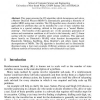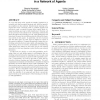119 search results - page 17 / 24 » Inter-Task Action Correlation for Reinforcement Learning Tas... |
118
click to vote
ICML
1994
IEEE
15 years 6 months ago
1994
IEEE
Compositional Q-Learning (CQ-L) (Singh 1992) is a modular approach to learning to performcomposite tasks made up of several elemental tasks by reinforcement learning. Skills acqui...
130
click to vote
FLAIRS
2004
15 years 4 months ago
2004
er provides new techniques for abstracting the state space of a Markov Decision Process (MDP). These techniques extend one of the recent minimization models, known as -reduction, ...
150
Voted
PRICAI
2000
Springer
15 years 6 months ago
2000
Springer
This paper presents the CQ algorithm which decomposes and solves a Markov Decision Process (MDP) by automatically generating a hierarchy of smaller MDPs using state variables. The ...
132
click to vote
ATAL
2007
Springer
15 years 9 months ago
2007
Springer
To cope with large scale, agents are usually organized in a network such that an agent interacts only with its immediate neighbors in the network. Reinforcement learning technique...
150
click to vote
ROBOCUP
2000
Springer
15 years 6 months ago
2000
Springer
Q-learning, a most widely used reinforcement learning method, normally needs well-defined quantized state and action spaces to converge. This makes it difficult to be applied to re...


